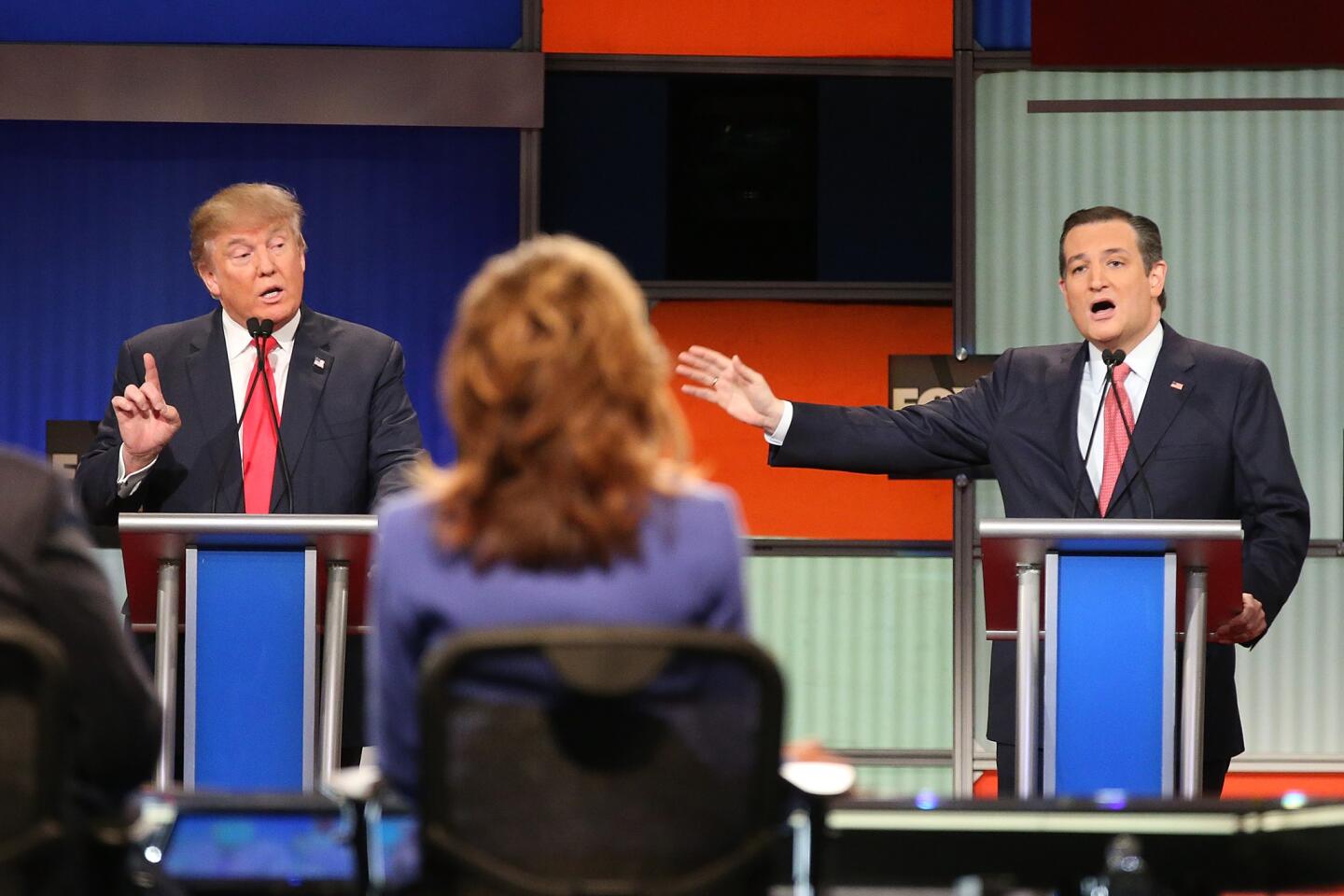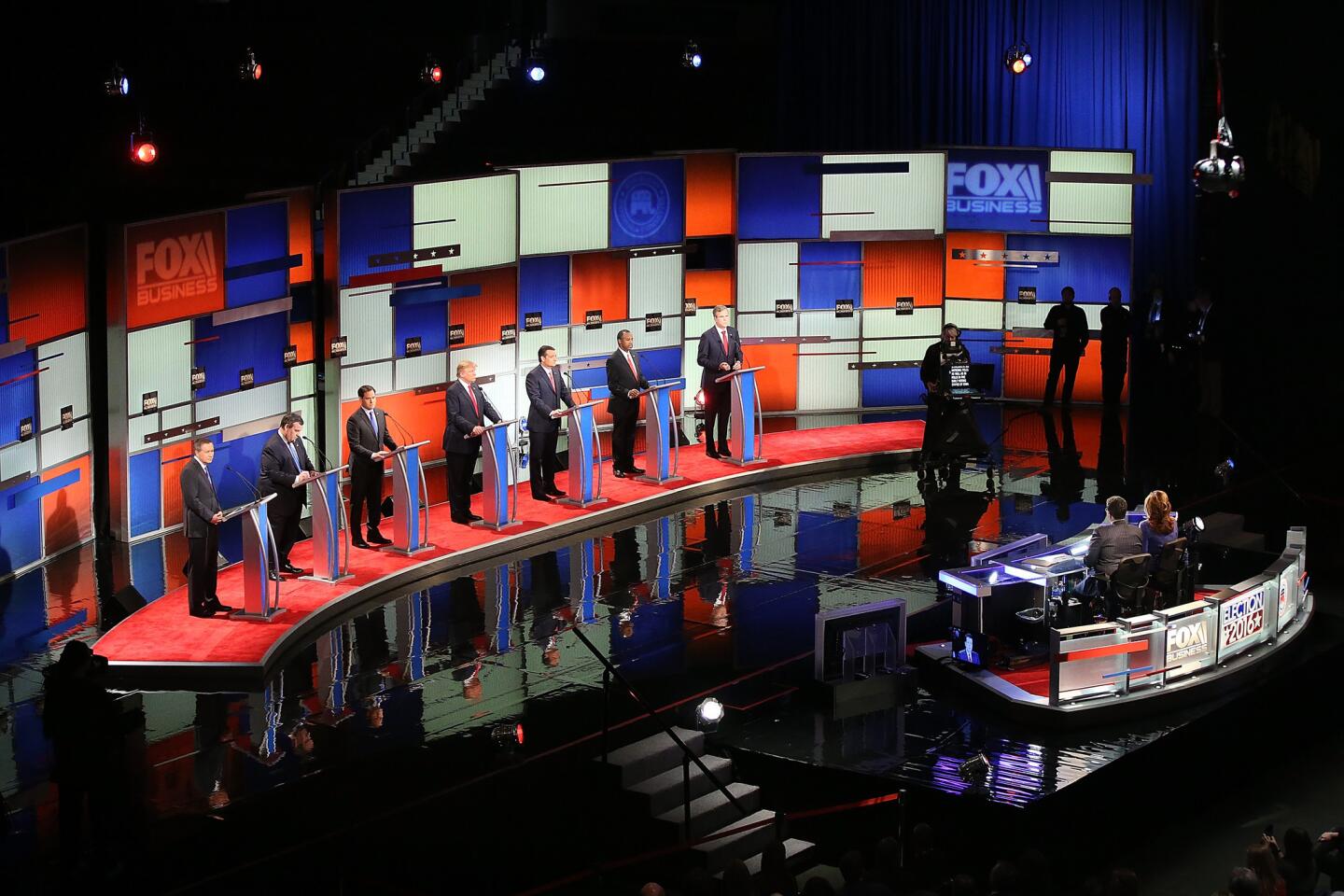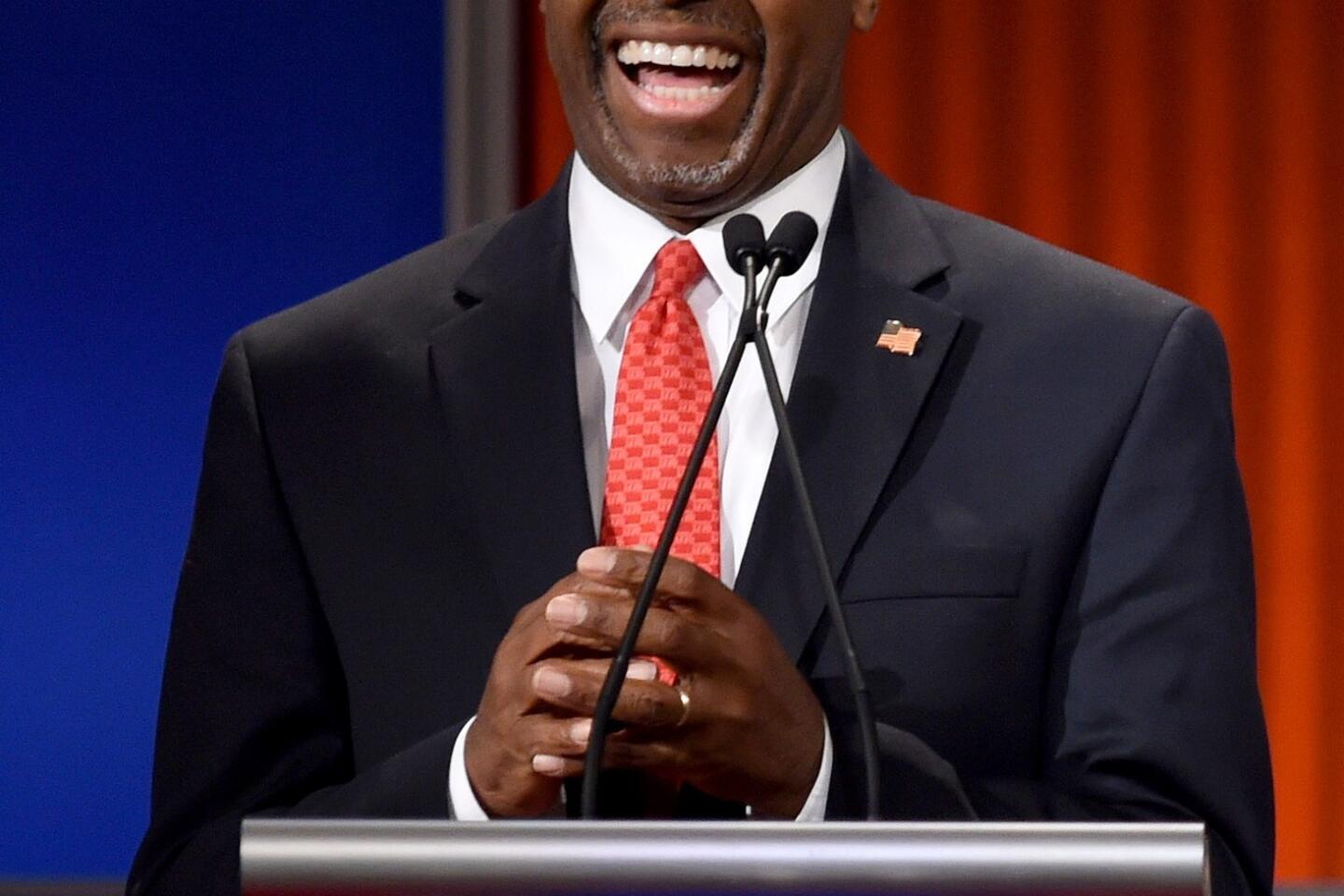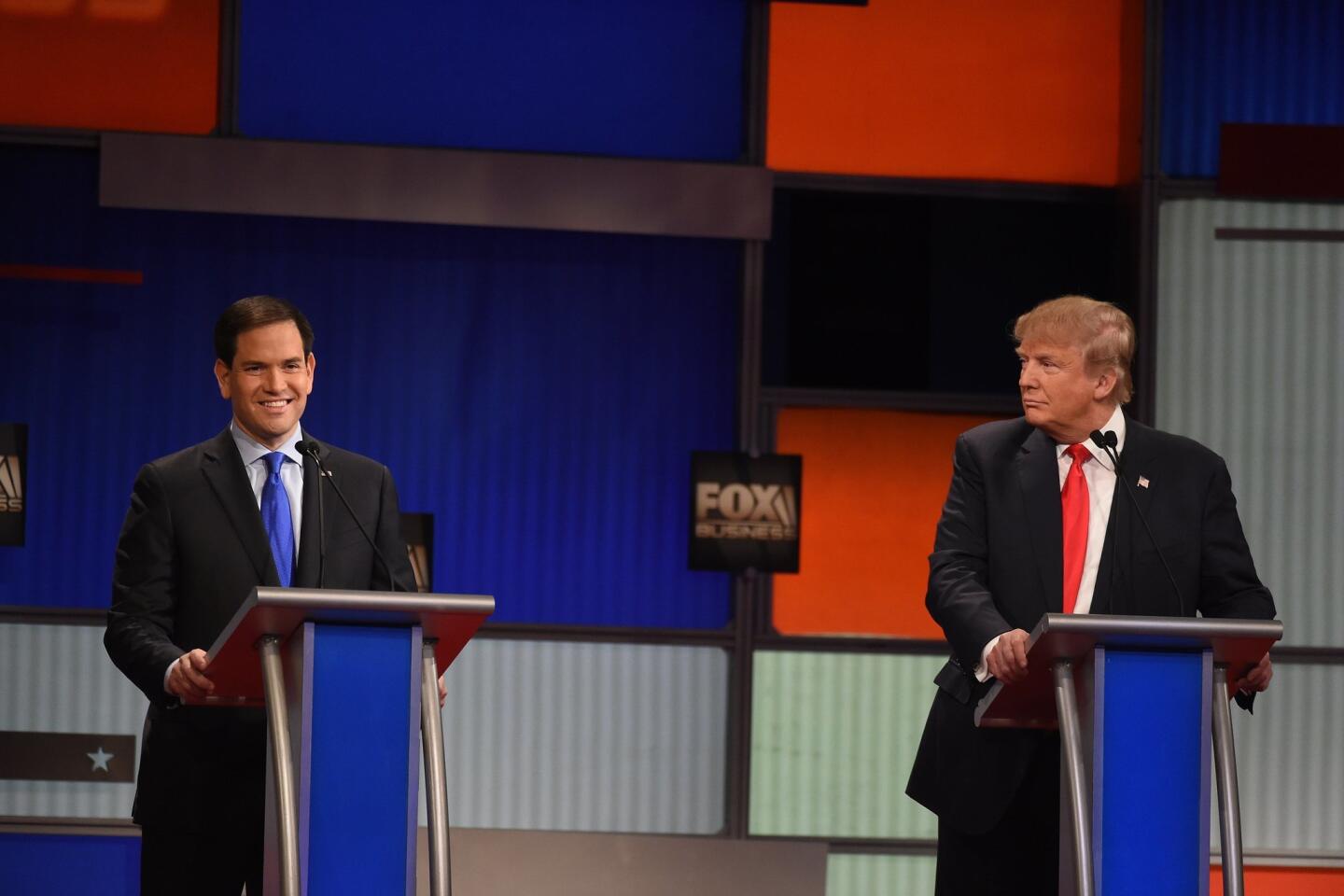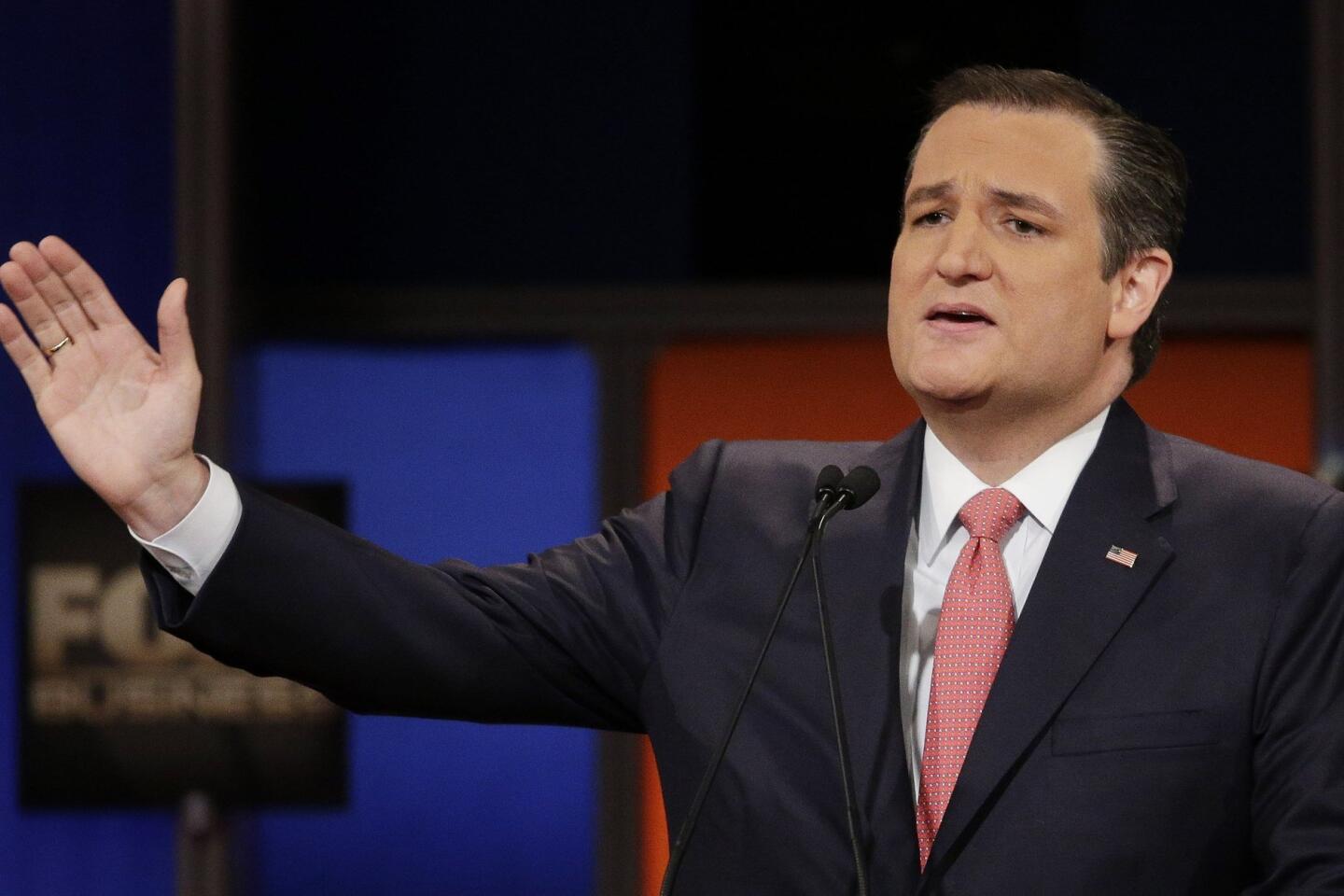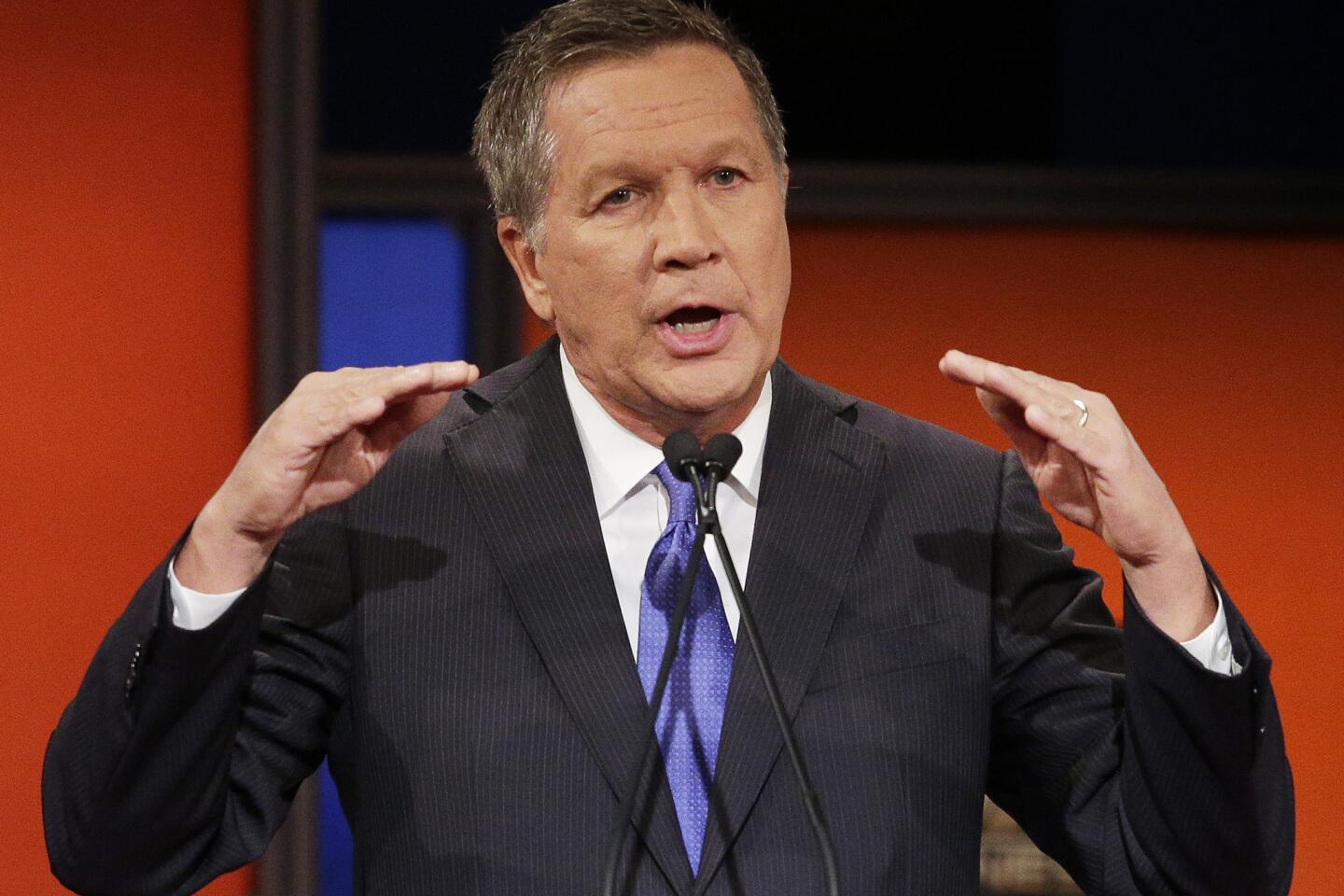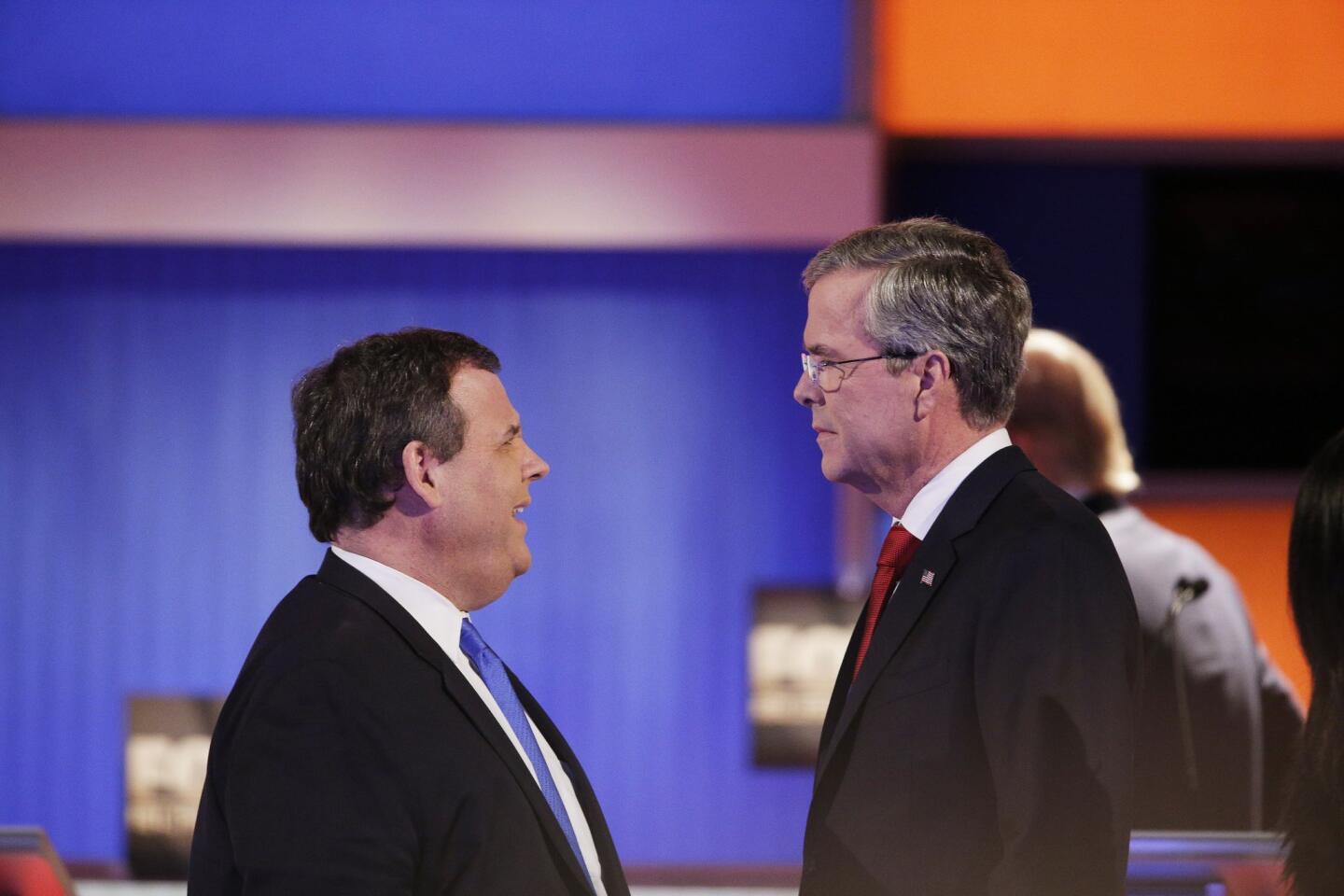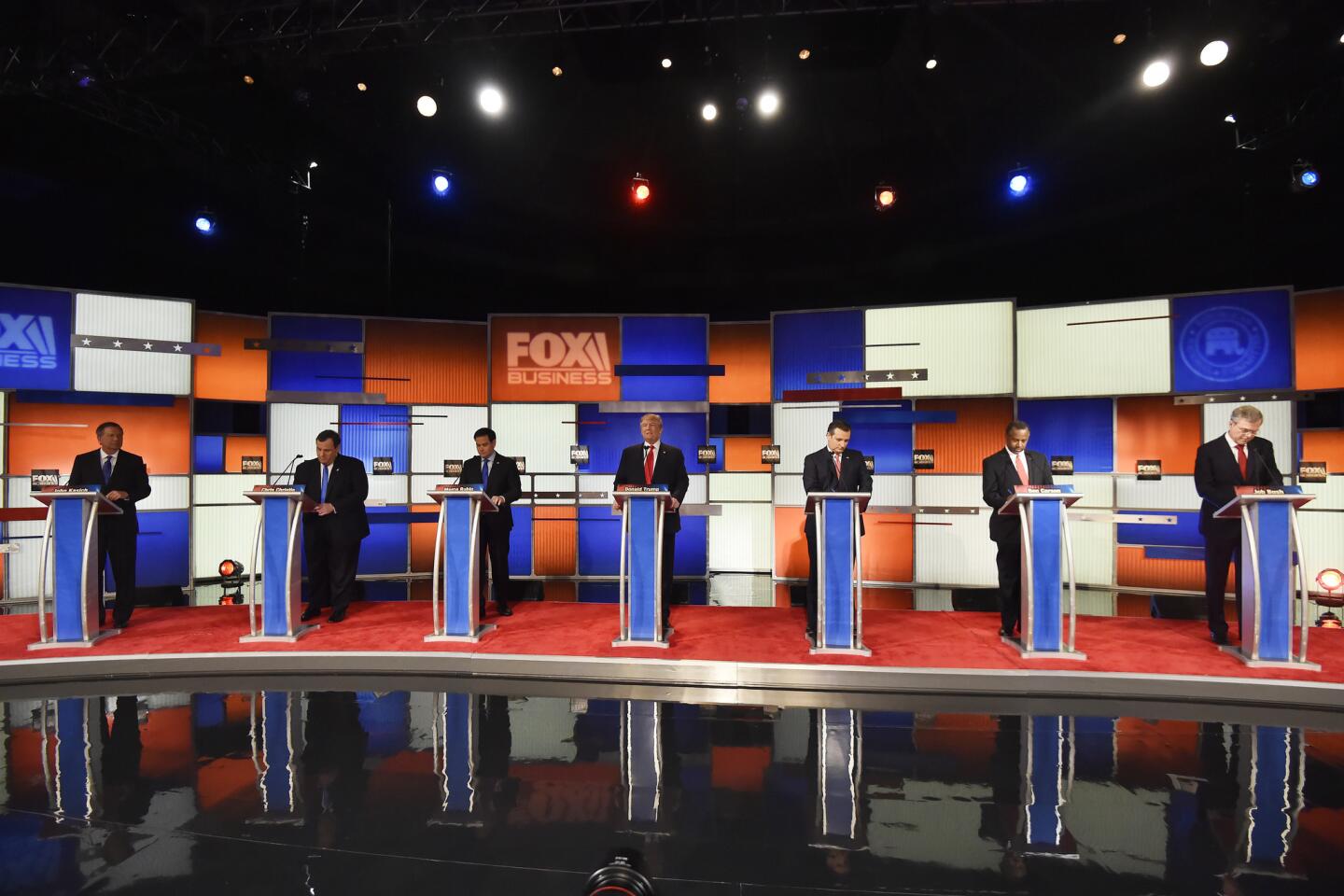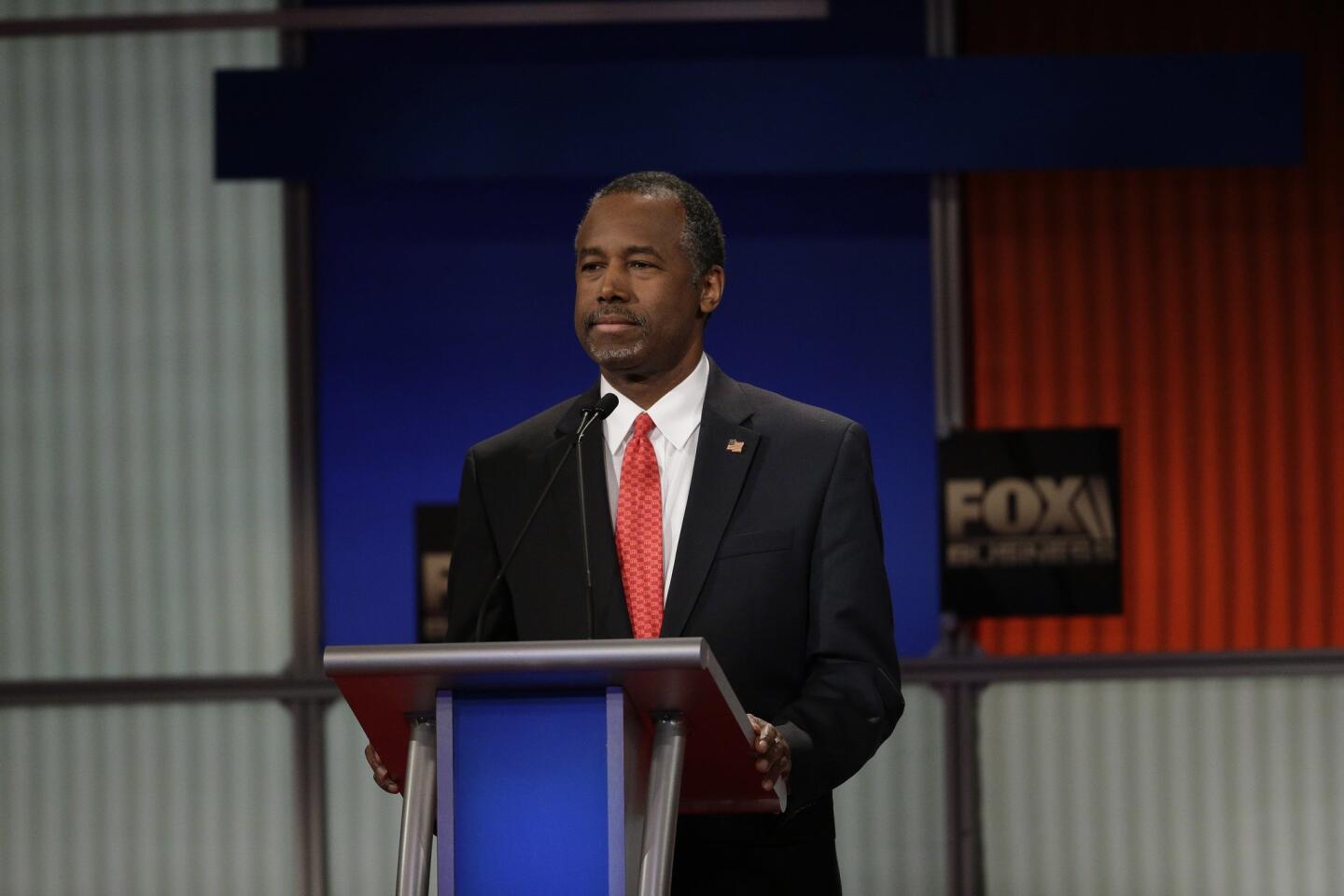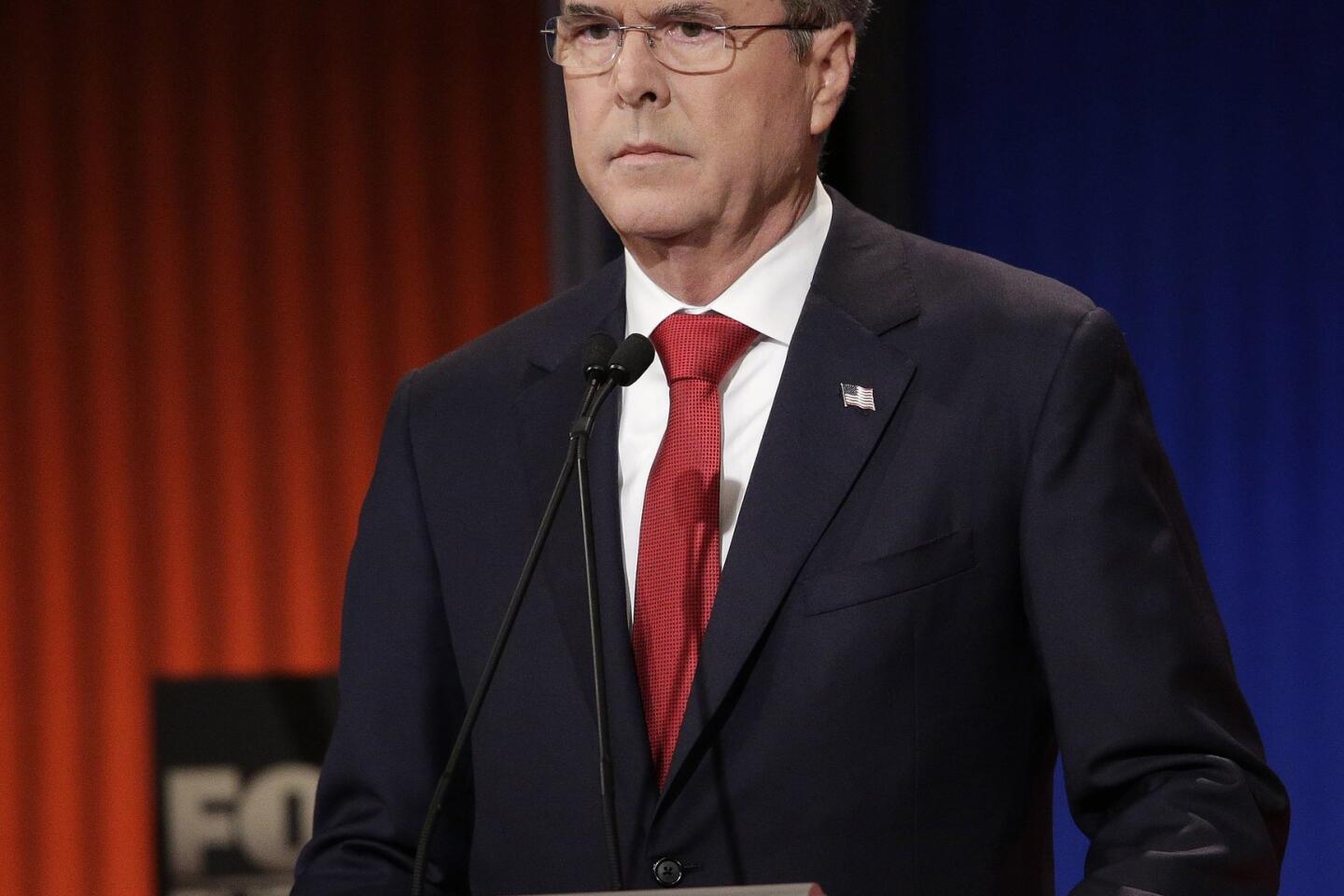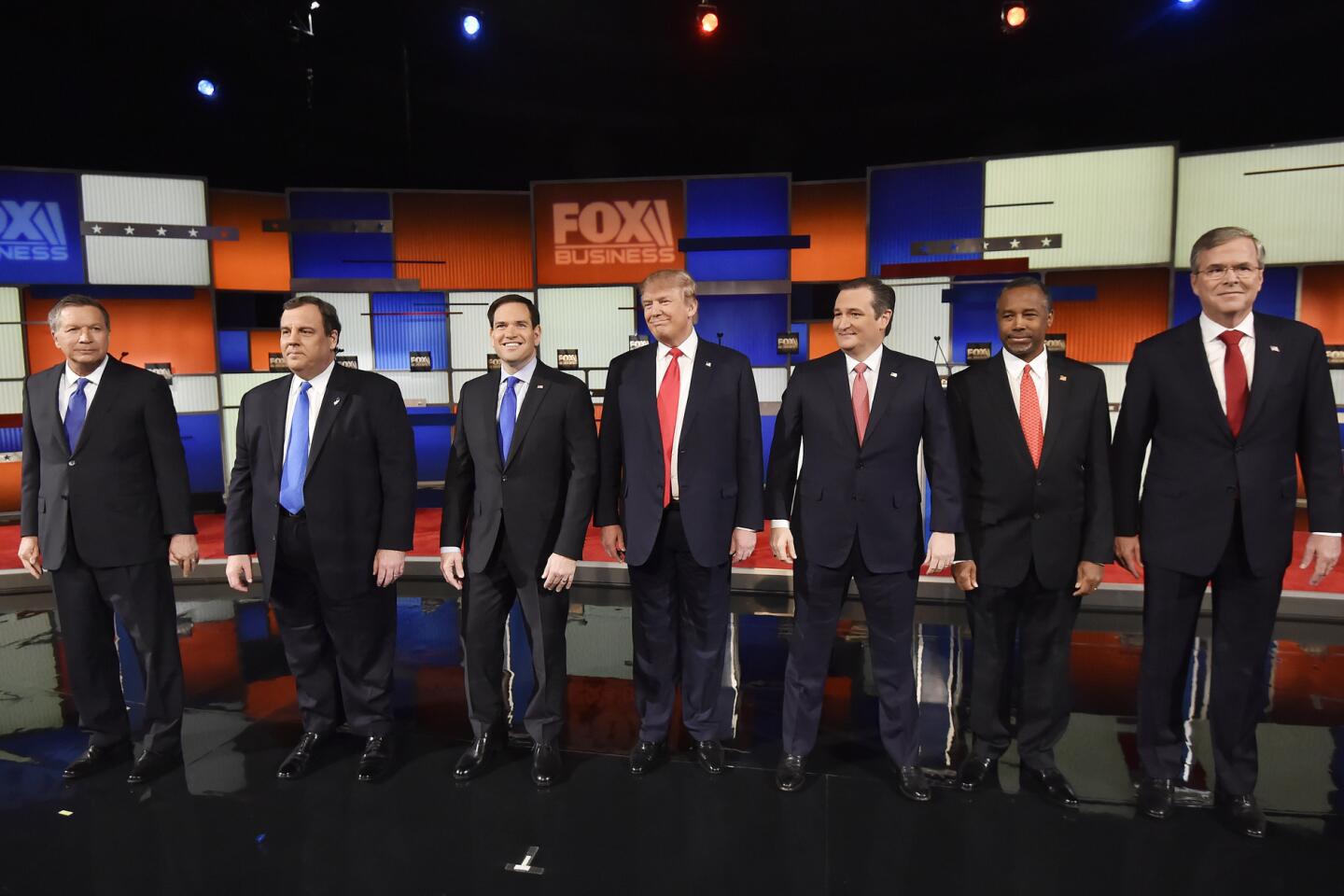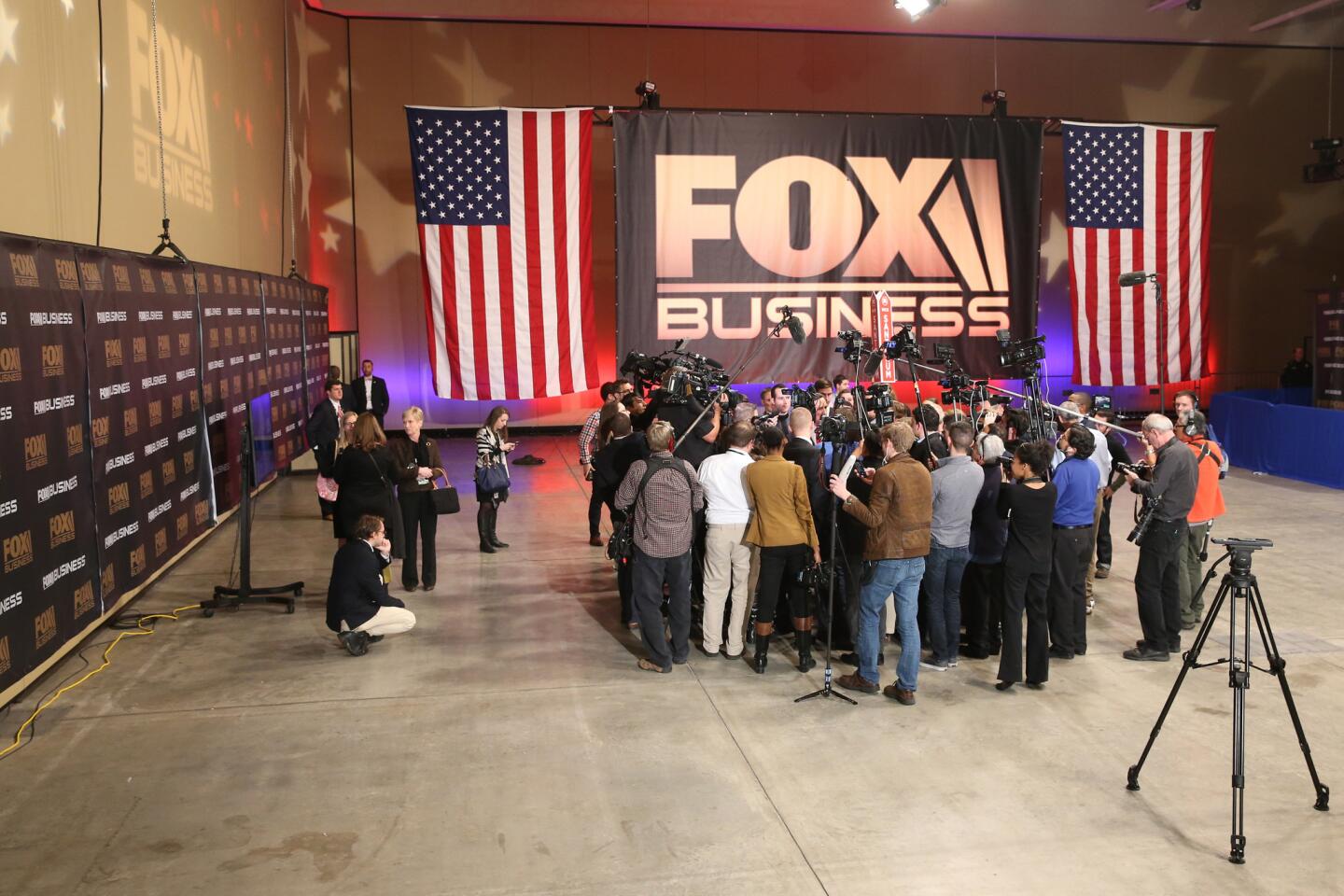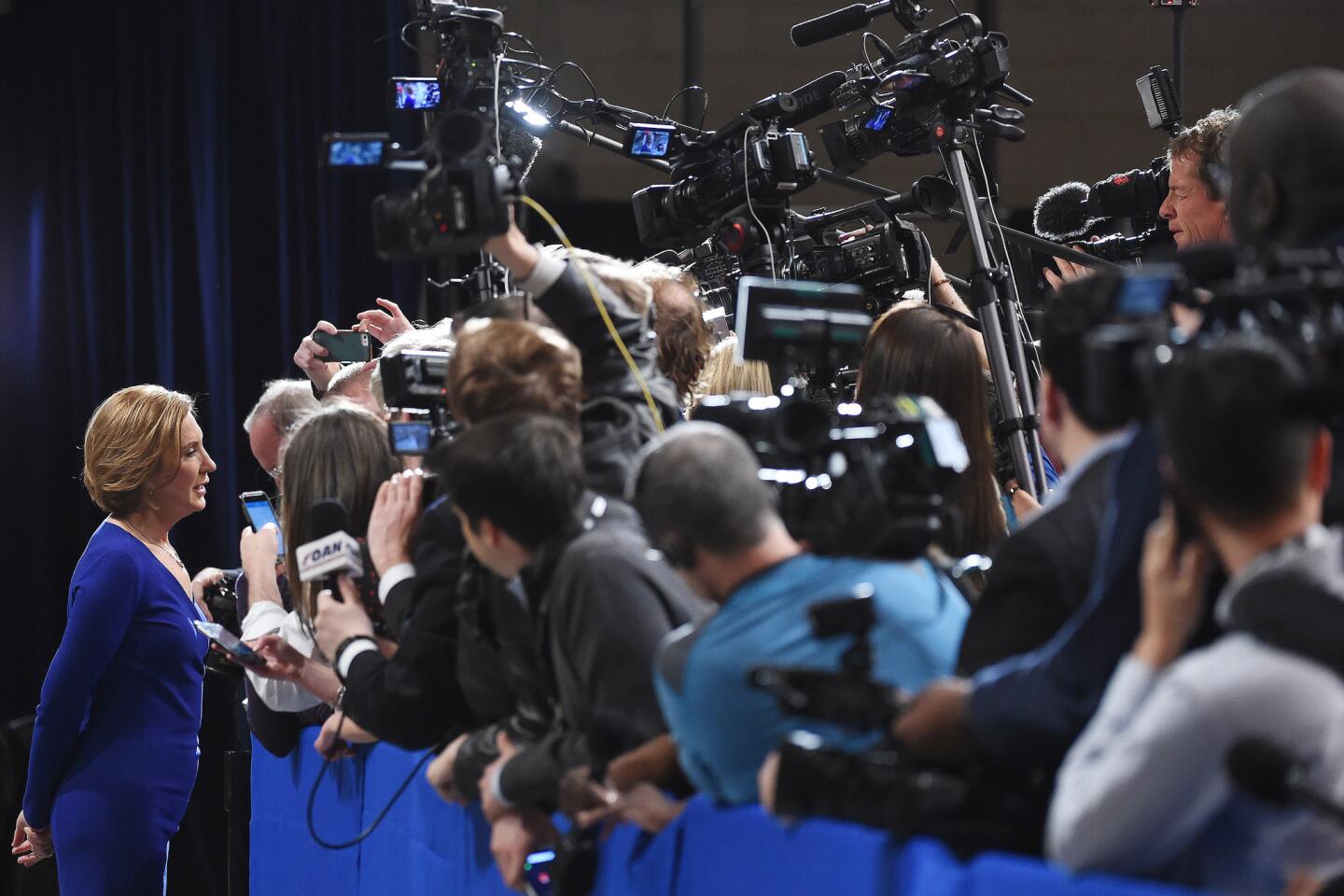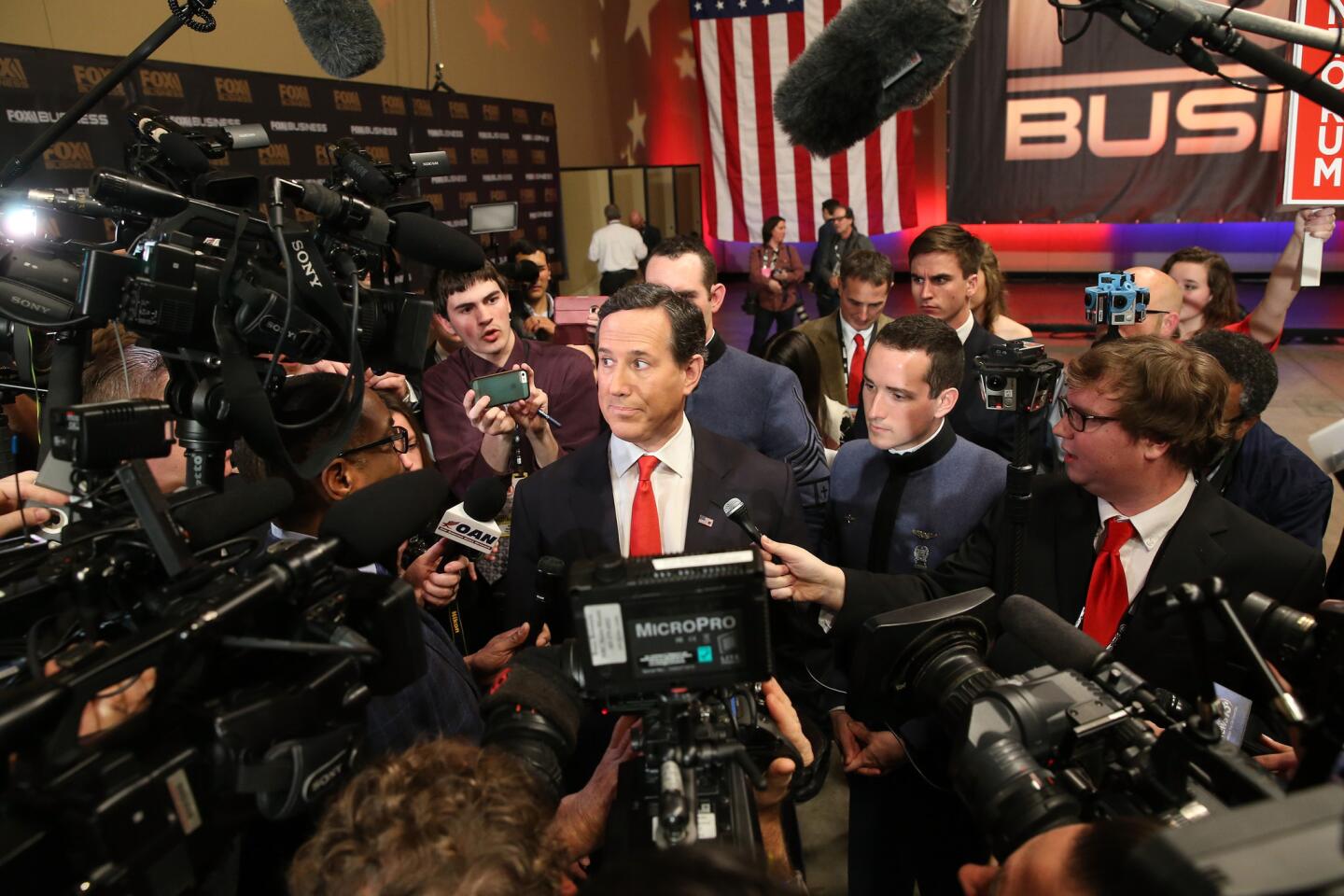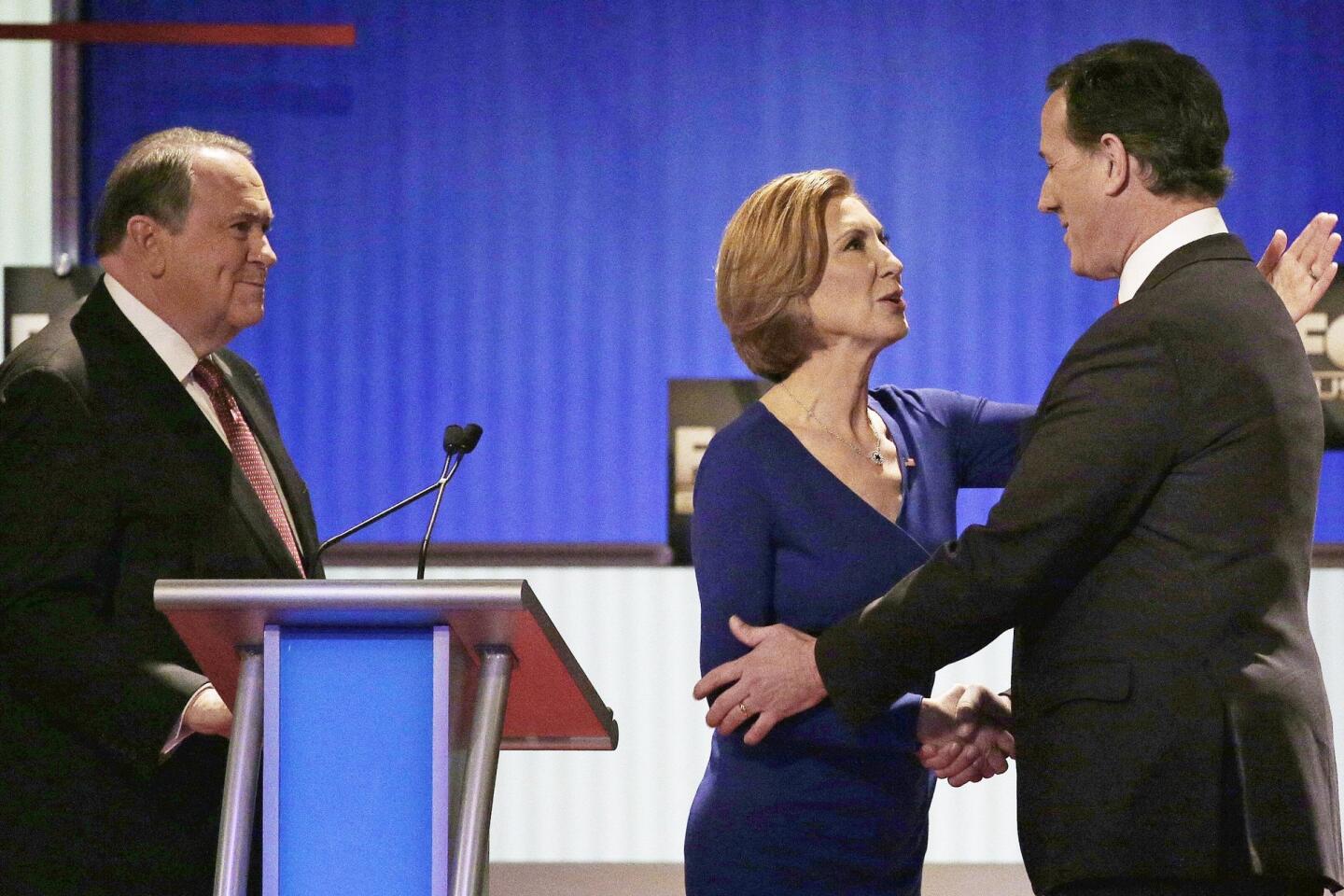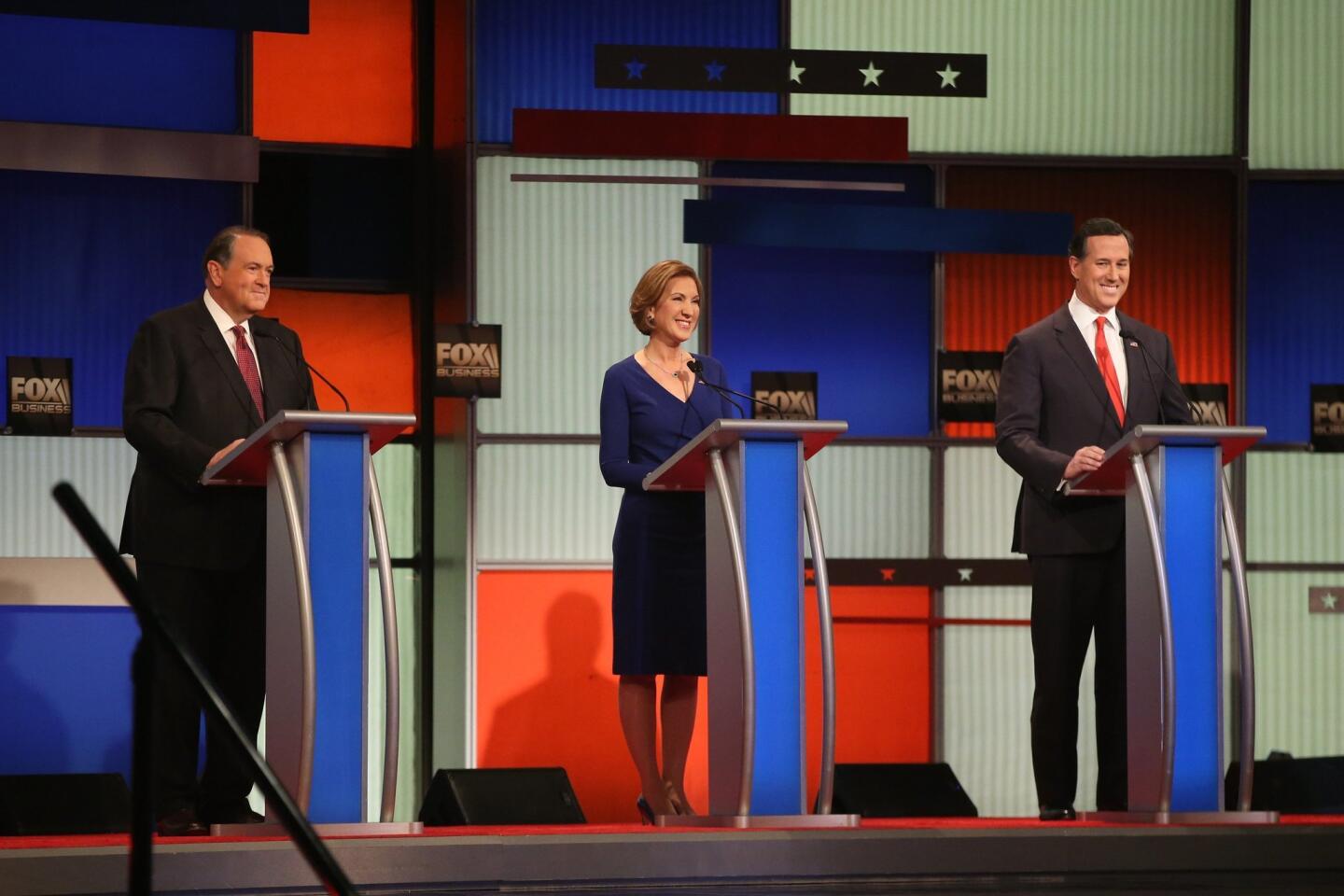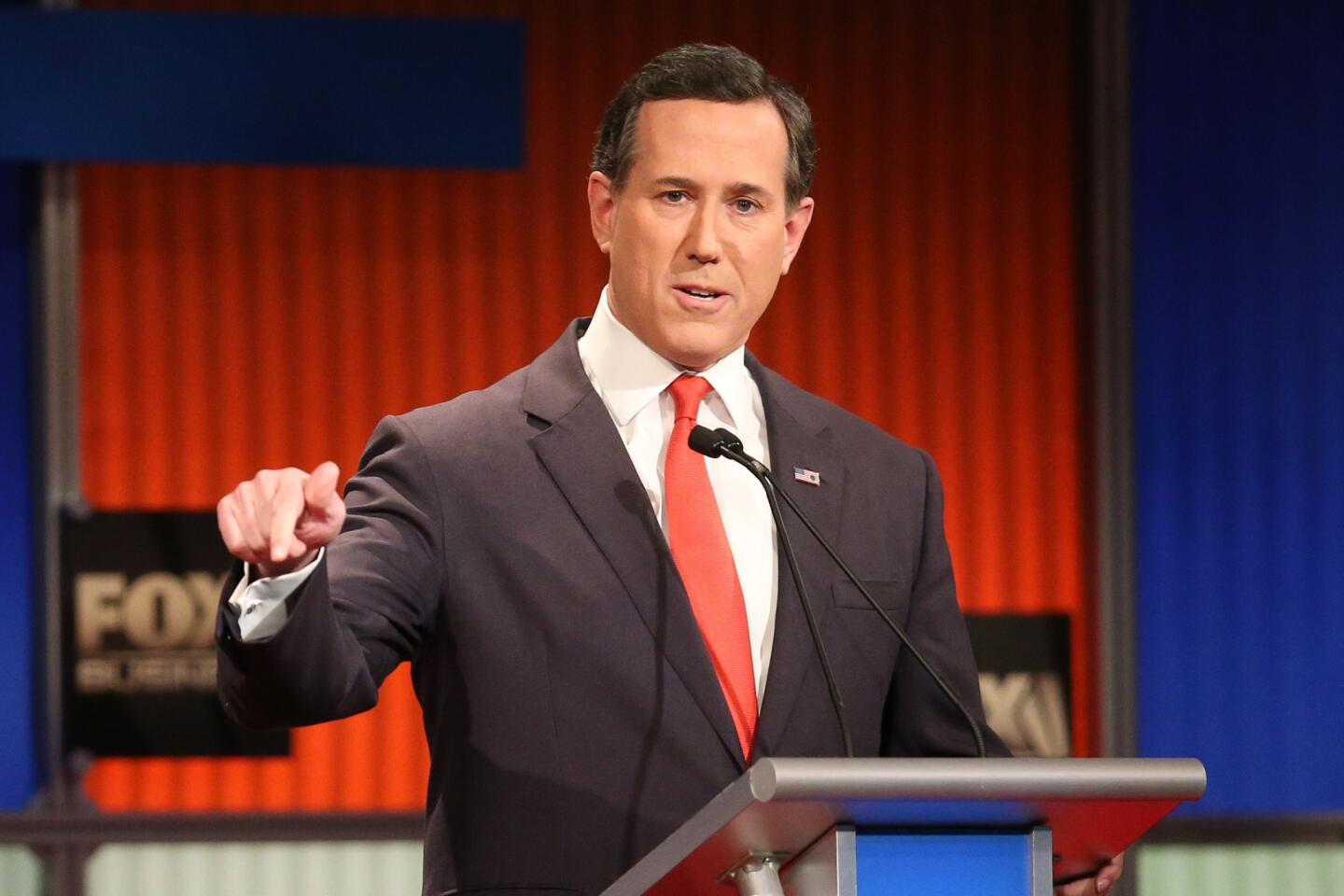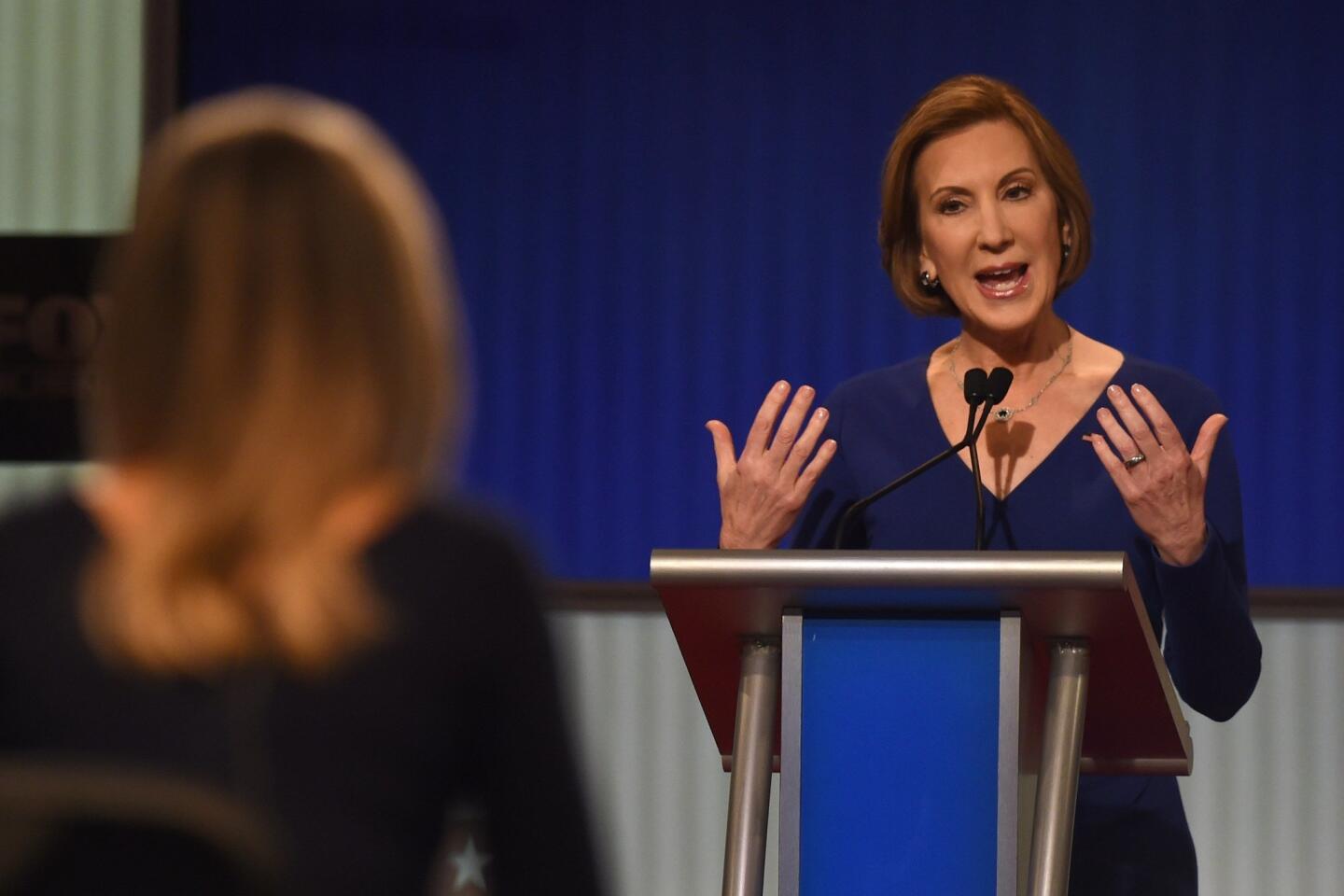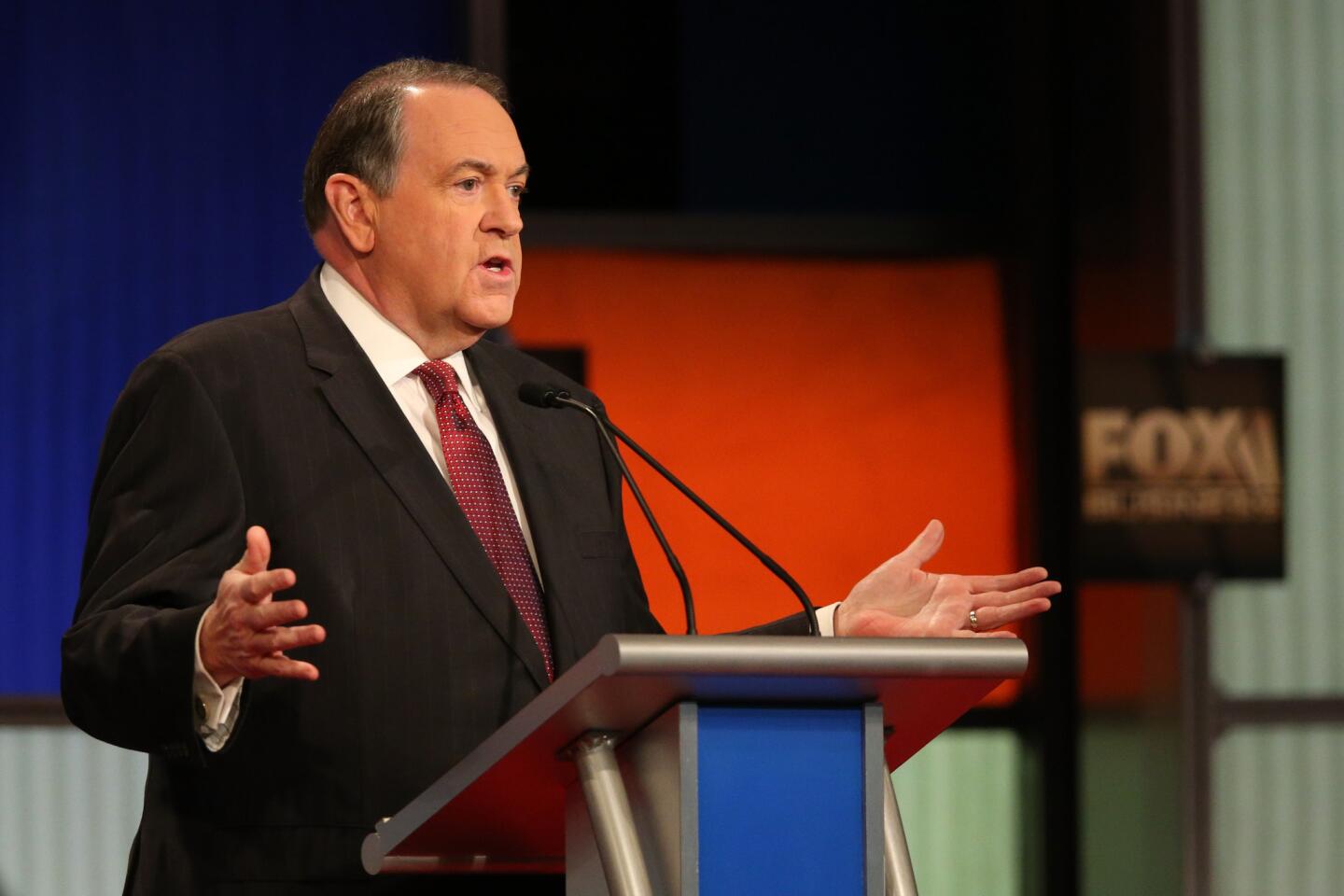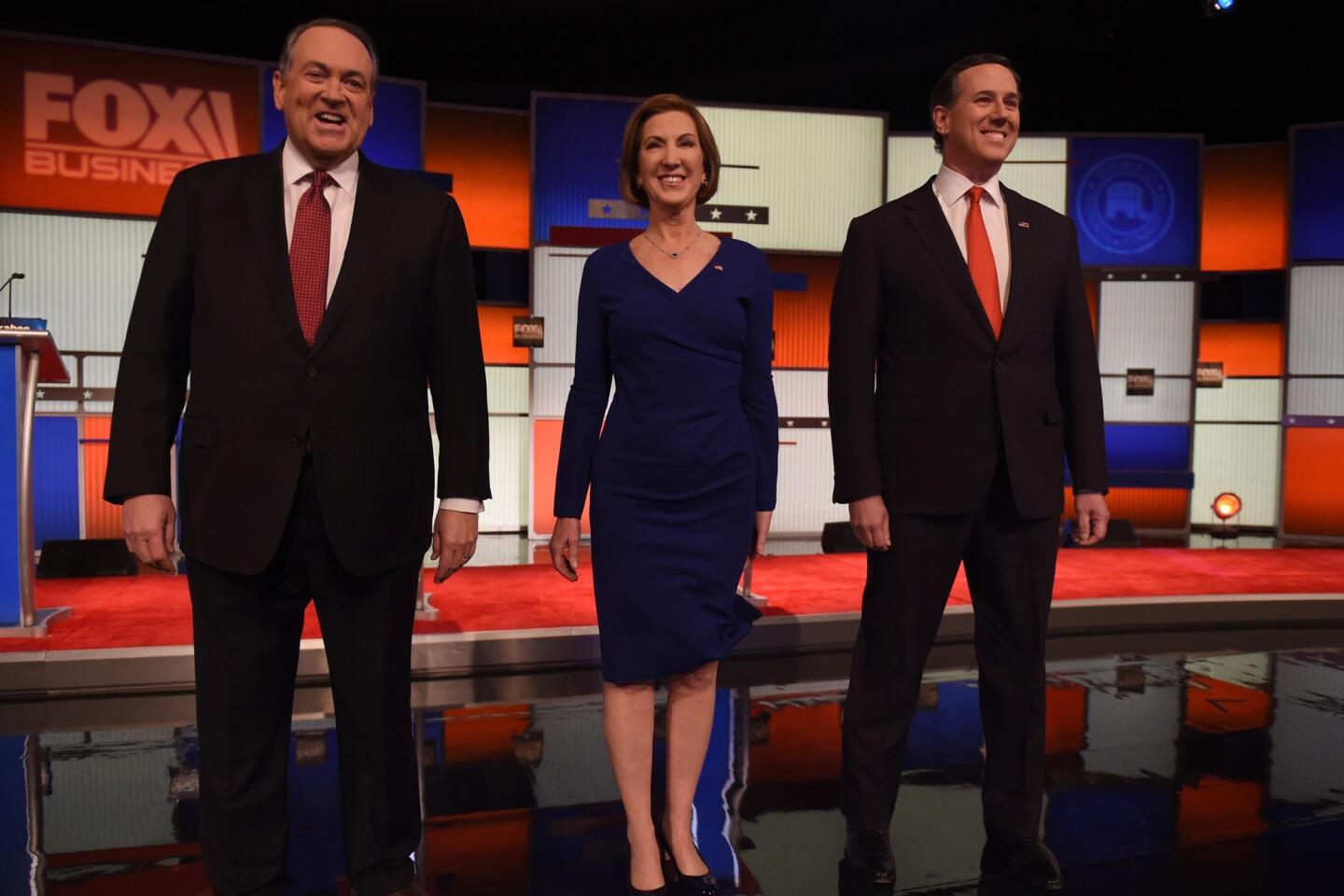As the 2016 balloting nears, Republican debate takes on a barbed edge
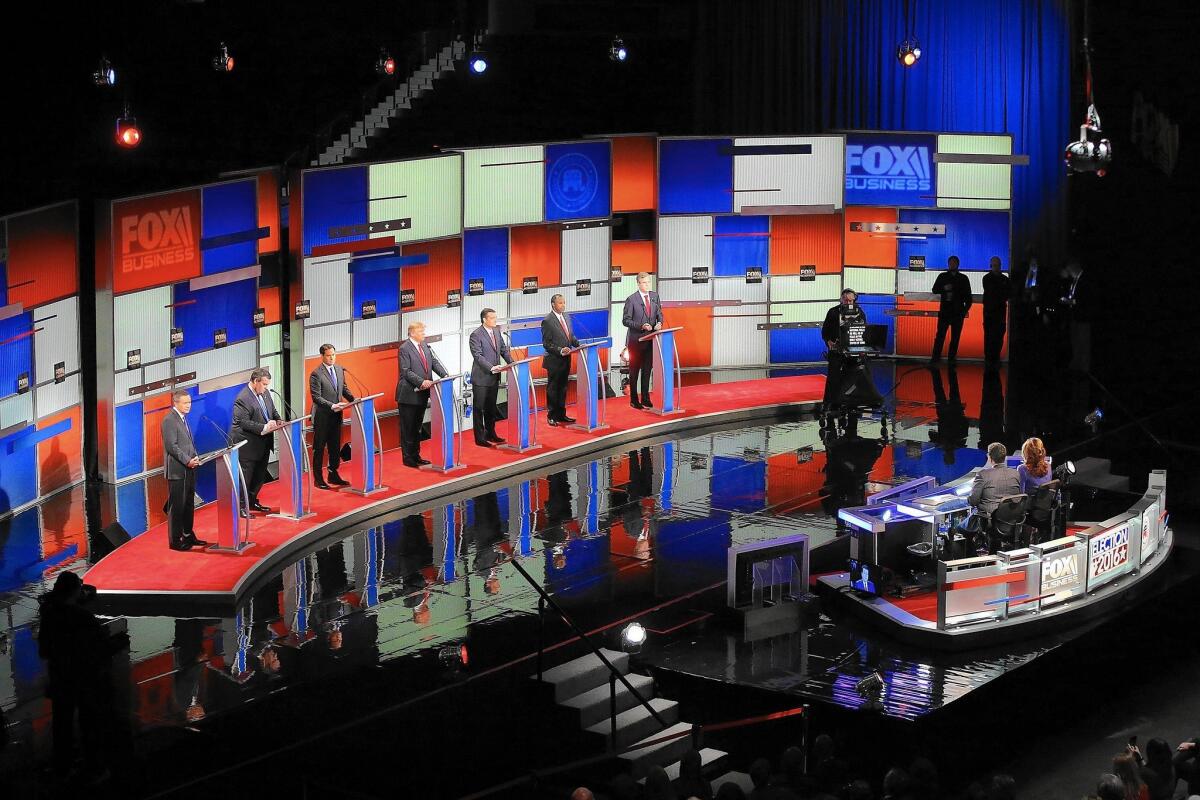
The lineup on the main stage for the Republican debate in North Charleston, S.C., was down to seven contenders.
reporting from north charleston, s.c. — With the balloting just over two weeks away, the Republican presidential race took a sharply negative turn Thursday night in a hard-edged debate filled with personal jabs over integrity and electability.
When Donald Trump challenged Ted Cruz’s legal standing to serve as president, citing his birth in Canada, Cruz accused him of desperation.
When Cruz mocked Trump’s “New York” values, Trump invoked the Sept. 11 attacks and called it an insult to the city.
When Marco Rubio called Chris Christie a Northeastern clone of President Obama, the New Jersey governor suggested Rubio was a hypocrite acting out of political expediency.
“Two years ago, he called me a conservative reformer that New Jersey needed,” Christie said. “That was before he was running against me. Now that he is, he’s changed his tune.”
The debate, the sixth of the Republican presidential contest and the first of the new year, reflected an added urgency as the wide-open contest hurtled closer to the Iowa caucuses, which launches the presidential balloting on Feb. 1. The first primary comes eight days later in New Hampshire, followed by South Carolina, where the candidates gathered Thursday night in a minor-league hockey arena.
For months, Trump has held a sizable and steady lead in national polls. But as the voting nears, the focus has narrowed to the handful of opening states, where the contest is much closer.
In Iowa, the businessman and reality TV star is running neck-and-neck with Cruz, according to surveys, and after a long period of mutually agreed-upon amity the billionaire recently shifted his tactics, launching a near-daily series of attacks on the Texas senator.
Most notably, Trump raised questions about Cruz’s eligibility to serve as president, citing his birth in Calgary, where his father worked for a time in the oil industry. Although many legal experts say Cruz meets the constitutional criteria — his mother was a U.S. citizen, automatically conferring the status on her son — Trump contends that the issue has never been fully adjudicated, making Cruz a risky choice for the GOP in the event of a court challenge.
Asked Thursday night about Trump’s assertions, Cruz said they were groundless and rose out of political pique.
“I recognize that Donald is dismayed that his poll numbers are flailing in Iowa,” Cruz said. “But the facts and the law are really quite clear.”
Trump continued to press his case — over groans and jeers from the partisan crowd — saying the nomination of Cruz could cost Republicans the White House. “There’s a big question mark on your head … and you can’t do that to the party,” Trump said.
Later, it was Cruz who was thrown on the defensive when asked about a recent comment deriding Trump’s “New York” values.
He cited a 1999 Trump interview in which he took positions at variance with his current conservative stance, including support for legal abortion, explaining that was “what we believe in New York.”
Trump replied by citing the trauma the city suffered on Sept. 11, 2001, and the heroism of its citizens during its slow, painful recovery. As Cruz joined the audience in applause, Trump stabbed a finger toward his rival and declared, “That was a very insulting statement that Ted made.”
Cruz was also forced to explain a published report that he failed to properly disclose hundreds of thousands of dollars in loans to his 2012 U.S. Senate campaign, including an infusion from Goldman Sachs, where his wife, Heidi, works.
He sarcastically thanked the debate’s co-moderator, Fox Business News anchor Maria Bartiromo, “for passing on that hit piece” by the New York Times and described the mistake as a mere “paperwork error.”
Coming two nights after Obama delivered his State of the Union address, much of the nearly 2 1/2-hour session amounted to a partisan rejoinder.
“On Tuesday night, I watched story time with Barack Obama,” Christie said to a roar from the audience, “and let me tell you, it sounded like everything in the world was going amazing.”
And the candidates seemed just as eager to slam the Democratic front-runner, Hillary Clinton, with frequent invocations of the “Obama-Clinton economy” and “Obama-Clinton” foreign policy, as though the two were running mates or full-time partners the last eight years.
Jeb Bush, citing the ongoing investigation into Clinton’s use of a private email server as Obama’s first secretary of State, said she “would be a national security disaster” and, if elected, might spend her first 100 days as president “going back and forth between the White House and the courthouse. We need to stop that.”
The audience also cheered its affirmation when retired neurosurgeon Ben Carson was asked whether Bill Clinton’s sexual scandals were fair game in the general election.
Carson said it was and framed it as a larger question of morality: “Is this America anymore? Do we still have standards? Do we still have values and principles?”
In his speech Tuesday night, the president delivered a thinly veiled rebuke of Trump, decrying those who play on the fears and darker impulse of voters. Trump has vowed to wall off Mexico and keep Muslims from entering the country, for at least a limited time.
More striking than Obama’s remarks, though, was the criticism from South Carolina Gov. Nikki Haley, who delivered the GOP’s nationally televised response. The child of immigrants from India, Haley echoed Obama, telling her own family’s story and warning against “the siren call of the angriest voices.”
Asked at the debate about Haley’s comment, Trump smiled into the audience, where the governor was seated, and said the two are friends. But, as usual, he did not back down.
“I’m very angry because our country is being run horribly,” he said, listing a catalog of ills. “And I will gladly accept the mantle of anger.”
Much of the evening plowed familiar ground.
Trump and Bush renewed their clash over Trump’s call for a temporary halt on Muslim immigration into the United States. Trump held fast, saying, “We have to stop with political correctness,” the major theme of his candidacy.
Bush also declined to back off his earlier assertion that Trump was “unhinged,” though he noted it did not apply to voters who say they agree with Trump. “I can see why people are angry and scared because this president has created a condition where our national security has weakened dramatically,” Bush said.
Other candidates echoed calls for barring Syrian refugees, tightening scrutiny of other foreign visitors and doing a better job than Obama of defeating Islamic terrorists.
“I’ve been for pausing on admitting the Syrian refugees,” Ohio Gov. John Kasich said. “But, you know, we don’t want to put everybody in the same category.”
The candidates were all eager to talk about guns, trying to outdo themselves in portraying Obama as a fierce opponent of the 2nd Amendment right to bear arms.
Trump said that “you wouldn’t have 14 … people dead right now” in San Bernardino or more fatalities in last year’s Paris attacks if more citizens had been armed.
The debate stage was less crowded than it has been, with just seven candidates sharing time, compared with as many as 11 in prior sessions.
Trump was spared one of his biggest antagonists, Kentucky Sen. Rand Paul. He and Carly Fiorina, the former Hewlett-Packard chief executive, were both relegated to the lower-tier debate because their low poll numbers failed to meet Fox’s criteria. Paul was so incensed he skipped the undercard event.
Fiorina and the others onstage, former Arkansas Gov. Mike Huckabee and former Pennsylvania Sen. Rick Santorum, largely avoided clashes with one another, targeting Democrats instead.
Bierman reported from North Charleston and Barabak from Marshalltown, Iowa. Times staff writer Michael Finnegan in Los Angeles contributed to this report.
ALSO
As Democratic polls tighten, Clinton adopts a more aggressive approach
Debate takeaways: The Trump-Cruz feud is here to stay, and Rubio tries anger on for size
Trump inspires unease in both parties, as State of the Union and its response make clear
More to Read
Get the L.A. Times Politics newsletter
Deeply reported insights into legislation, politics and policy from Sacramento, Washington and beyond. In your inbox three times per week.
You may occasionally receive promotional content from the Los Angeles Times.


